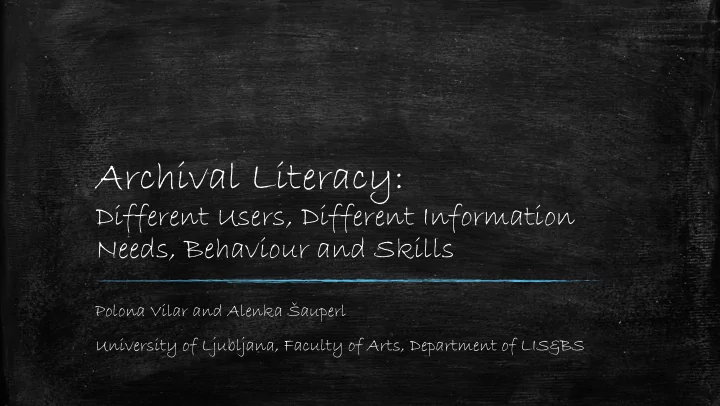

Archival Literacy: Different Users, Different Information Needs, Behaviour and Skills Polona Vilar and Alenka Šauperl University of Ljubljana, Faculty of Arts, Department of LIS&BS
Arc rchi hivists ts Archival val (SLO / O / prac ractice BIH) BIH) US USER ERS digi digiti- collec llectio ions zation zati ? onl online avai availa- pilo pilot bili ility stud study
User sers: - t ypes - needs, behav. & skills Inf nfor ormation on Our lite terac acy Professi ssional als study / / lay ay use users rs Archival val lite terac acy Know nowledge Long ong know known about users about rs in in LIS LIS
Methodology & Sample Semi-st struc ucture ured Purposive sive samp sample Cont ntent nt intervie rview (6) analy analysis (15 questions)
Results & Discussion /1 General findings ▪ LIS professors / professional archivists – DIFFERENCES ▪ Professionals from different countries – NO DIFFERENCES
Results & Discussion /2 Types of Users & Their Needs, Behaviour, Skills LIS IS pro rofe fesso ssors rs: Archiv ivist ists: ▪ 3-4 groups ▪ 4-5 groups User Us er typ type N Researchers 6 ▪ Creators not users ▪ Creators, pupils as users lay users 6 ▪ No pupils ▪ Professional archivists as students 5 users official users 2 ▪ No professional archivists ▪ Future: archivists 2 cultural tourists – More users (remote & 1 ▪ Future: physical) retired users 1 – More remote, less – Easier access & less problems creators 1 physical users / more problems pupils – Less work for 1 archivists – „Marketing“ effect
Results & Discussion /3 Knowledge of Professionals Vs. Lay Users ▪ Very different! Ty Type pe of of kno knowle wledg dge N organization of materials 5 ▪ What is professional knowledge of archivists? organization, structure of archive 4 processing of materials 4 understanding of materials & provenance 3 ▪ In digital archives: language and script 2 – Competences for searching history 1 and ICT content 1 – Knowledge of legal issues understanding of how archive works 1 and data security
Results & Discussion /4 Information Literacy & Archival Literacy ▪ Comment of IL 2014 definition by ACRL Task Force – Appropriate also for archives, but too general – More appropriate for education area ▪ Knowledge of AL – LIS professors YES / archivists NO – 3x: the same skills as in IL, but in an archive – 1x: „to know how to get around an archive, find documents, read them and use them properly“
Results & Discussion /5.1 Knowledge of/about the Users ▪ LIS professors / archivists ▪ Theoretical coverage: Not much ▪ Archivists‘ education: None ▪ Lack of knowledge: mainly NO, 1x knowledge of user characteristics ▪ Necessary competences: – A: contextual knowledge (e.g. history), knowledge of ICT – P: pedagogical knowledge, knowledge of user characteristics ▪ Sources to use: statistics – this does not solve teaching-related or need-related problems.
Illustration „Sometimes I need a thorough interview with the user to exactly understand the need.“ – but archivist doesn’t feel that her work could benefit from any systematic approach towards information regarding the users. „The number of users in our archive is too low to require understanding of user needs and behaviour in general – instead we can only tend to specific needs and behaviour of a specific user.“
Results & Discussion /5.2 Knowledge of/about the Users ▪ Influence of online access – 4x: importance of usr-related issues will increase, due to having direct influence on quality of work – 2x: no influence
To conclude /1 ▪ User-related topics not yet part of archival theory ▪ In practice: Archivists see some user-related problems, but are as yet unable to clearly define them, and end up solving them on a daily basis. ▪ User characteristics – no important role in archival services – The users more or less left to themselves. ▪ A good starting point to seek relations with LIS – Problem: Non-archivists doing the research! ▪ Image / content
To conclude /2 ▪ Three areas: – User characteristics, behaviour and needs, – User competences, – Archivists‘ competences. ▪ This is needed, especially in the light of increasing online presence of archives. – Note: This study intended to look at context of digital archives, but couldn’t avoid traditional ones.
Than Thank you ou polona.vilar@ff.uni-lj.si alenka.sauperl@ff.uni-lj.si
Recommend
More recommend